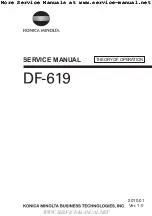
6
7
6. DMX512 Connections
The DMX512 protocol is used widely in intelligent lighting control, with a
maximum of 512 channels.
1. If your controller has a 5-pin DMX output, you need to use a 5-pin to 3-pin
adapter cable.
2. Link the fixtures together in a “daisy chain” by connecting XLR cables from
the output of the fixture to the input of the next fixture. The cable cannot be
branched or split to a “Y” cable. Inadequate or damaged cables, soldered
joints, or corroded connectors can easily distort the signal and shut down
the system
3. The DMX output and input connectors are pass-through to maintain the DMX
circuit when one of the units’ power is disconnected.
4. At the last fixture, the DMX cable should be terminated to reduce signal
errors. Solder a 120 ohm 1/4W resistor between Pin 2 (DMX-) and Pin 3
(DMX+) into a 3-pin XLR plug and connect it to the last fixture’s DMX output.
5. Each lighting fixture must have its address set to receive data sent by
the controller. The address number is between 0-511 (usually 0 & 1 are
equal to 1). Please refer to “4.2 Main Function” above.
6. 3-pin XLR: Pin 1: GND, Pin 2: Negative signal (-), Pin 3: Positive signal (+)
5-pin XLR: Pin 1: GND, Pin 2: Negative signal (-), Pin 3: Positive signal (+)
Pin 4/5: Not used.
7. Troubleshooting
Following are a few common problems that may occur during operation. Here
are some suggestions for easy troubleshooting:
A. The fixture does not work, no light
1. Check the connection of power and mains fuse.
2. Measure the mains voltage on the main connector.
B. Not responding to DMX controller
1. DMX LED should be on. If not, check DMX connectors and cables to
verify they are linked properly.
2. If the DMX LED is on and the channel does not respond, check the
address settings and DMX polarity.
3. If you have intermittent DMX signal problems,check the cable and fixture
connectors for proper function.
4. Try to use another DMX controller for comparison.
5. Check if the DMX cables are run near or alongside high voltage cables
that may cause interference to the DMX interface circuit.
C. Some fixtures don’t respond to the controller
1. You may have a break in the DMX cabling. Check the LED for the
response of the master/ slave mode signal.
2. Wrong DMX address in the fixture. Set the proper address.
D. No response to sound
1. Make sure the fixture does not receive DMX signal.
2. Check microphone to see if it is good by tapping the microphone.
8. Fixture Cleaning
Clean with soft cloth using a very mild household detergent. Always dry the
parts carefully.






















